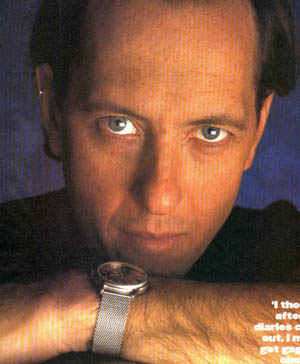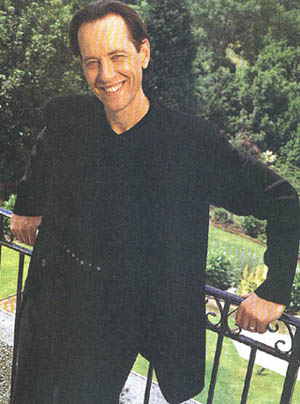A Novel Approach
Saturday Magazine – August 1998

A close mutual friend has warned me that Richard E. Grant likes to be the one who asks the questions, so it isn’t a surprise at all when the polite battery starts almost the moment he opens the door. Did I have to travel far to get here? Where do I live? How old is my baby? How long was I in labour? Was it a natural birth? Really? And so on and so forth until I feel I ought to remind him that we’re here to talk about him rather than me.
These are, in part, pre-emptive tactics. A somewhat bleak figure of a man, but with off-putting intense eyes, he tells me later how he is still reeling from an interview last year in which the first three questions directed at him were: What was it like to be married to someone so much older than himself? Was he homosexual? And why had he made so many crap career choices? “I mean, why can’t we do Q & A, like in Interview magazine? We met at 10:50am at the Petersham Hotel in Richmond with a Reynolds’ view of the Thames; we had some orange juice; I was dressed in black; you were dressed in blue; your baby and your nanny and your nanny’s dog were in the car…..”
Here we go again, but then let’s not forget that this is probably where his real talent lies: observing other people. It is what shot his self-deprecating but deliciously indiscreet film diaries, With Nails, into the best-seller list. It is also what enabled Grant, at 41, to write his debut novel, By Design, which centers around an interior designer named Vyvian (“with blood type D for Discretion”) and his sidekick Marga, a celebrity masseuse who pretends to be deaf and dumb. Plus a whole lot of other crazies Grant met while living in Hollywood, but couldn’t have possibly included in his real-life diaries for fear of being sued for libel.
But let us start at the beginning, or at least where the diaries started, back in 1985 when Grant, an impoverished actor/waiter, was offered the lead role, playing a morose drunk in Withnail & I. The role instantly catapulted him into cult fame and a slew of films, including How To Get Ahead in Advertising, Bram Stoker’s Dracula, Bruce Willis’s famous turkey Hudson Hawk and Jack & Sarah. Grant faithfully chronicled it all in the diaries, from the “bonding” weekend with Winona Ryder at Francis Ford Coppola’s, to the LA party where he finally got to meet his childhood heroine, Barbra Streisand, to the time he had lunch at the Ritz with Naomi Campbell. It all made compulsive reading; as did the follow-up he wrote for a newspaper when he landed the role of the manager in Spiceworld – The Movie. It does beg to question, however, don’t directors and producers now run a mile when they see Grant and his pad of A4 coming? And isn’t he just a tiny bit worried that the publication of his novel may condemn him if not to panto then to advertising financial services on TV (something he did recently for the financial company b2)?
“It is something that worried my wife enormously,” admits Grant, “and I thought after the diaries came out, I might start getting gagging clauses. But there’s never been anything in any contracts and I haven’t had anyone coming up to me and saying, ‘I’ll never speak to you again.’ It’s never been my intention to write myself out of future employment.”
Certainly Grant has worked far to hard to get where he is, just to throw it all away. Born and bred thousands of miles away in Swaziland, the son of an Afrikaans education minister, Richard Esterhuysen, as he was then known, was an extraordinarily creative and industrious little boy. Unlike his young brother Stuart, who is now an accountant in Johannesburg, he was always writing plays and making puppet theatres in the family garage. After school, he went to study drama at the University of Cape Town. In 1982, realizing his desire for recognition was somewhat limited in South Africa, he moved to London and spent the first three years waiting tables to support himself while struggling along in fringe theatre. And the rest, if not exactly meteoric, is diary history.
But this is leaving out a huge chunk of Grant’s life. As friend will say, the key to him is his wife, the voice coach Joan Washington, whom he met at the London Actor’s Centre when she once asked him for help on Zulu dialects. Although Joan was 10 years older than Grant and had a son by a previous marriage, the couple fell madly in love and 15 years later are still described, despite the age difference, as the most compatible couple in the industry. “Joan’s his remote control,” as one friend puts it. “You should watch them both at dinner. Richard will go just a little over the top with one of his stories, she’ll give him a look from across the table and he’ll switch subjects immediately. She’s very strict and he adores her for that.”
That Grant has never succumbed to temptation – and, God knows, enough has been put in his way – may on one level have something to do with the fact he never touches a drop of alcohol. “Oh, I’ve tried,” he explains, “and, believe me, if I could I would. It’s just I have such a terrible allergic reaction to it. I had a glass of champagne at a wedding about eight years ago and it stayed in for 10 minutes. I had to leave and vomited for the rest of the day.”

But on a deeper lever, it is obviously something to do with the dreadful effect his own parent’s break-up had on him when his mother ran off with a mining engineer when he was just 11. It may also have something to do with the devotion he holds for their nine-year-old daughter Olivia. Indeed, the detailed questioning which took place at the beginning of this piece about birth experiences must have related to his own daughter’s traumatic birth and the death of her sister Tiffany, also a premature baby, who died just half an hour after she was born. True to form, he wrote all about it in his diaries, but there a few bleaker things I’ve read than Grant’s description of what happened in hospital afterwards, how nurses Polaroided the dead baby girl and then put a blanket over her as if to prepare her for sleep.
“I can’t set myself up in this moral ivory tower,” says Grant. “If I did, I wouldn’t be able to speak to half the people I know. I’m in a profession where people’s marriages are constantly threatened by attractions. But the nuclear fall-out of an arbitrary fling is huge. I see my daughter’s friends, and how divorce has affected them, and I see my daughter after I’ve had a row with Joan. Although it may not instantly affect her, you can be sure for the next day, she’ll be full of strop. Of course, either my wife or I could run off with someone else. As John Lennon said, life is what happens to you in between making plans. But I don’t know if I could face myself if I did something like that. Besides which, I’m a terrible liar.”
There’s nothing even vaguely sanctimonious about Grant – I find him far too arch and sophisticated for that. But, to me, there’s a kind of duplicity about him: on the one hand, he’s such a decadent – yes, even camp – figure of a man, and on the other, such a paragon of virtue.
Perhaps this is what makes him so perfect to play Sir Percy Blakeney, aka the Scarlet Pimpernel, in the no-expense-spared production by the BBC. It will be a tall order living up to the definitive Pimpernel Leslie Howard played in the Thirties, but Grant seems cut out for the role of the “ineffectual ponce who can barely raise his teacup without cocking a finger,” as he puts it, “and then goes off on heroic sorties to France, risking his life when he doesn’t need to.”
People shouldn’t make rude remarks about Grant’s “crap career choices”. With his flourishing writing career, it will be a long time before he appears as Prince Charming in the local panto.








